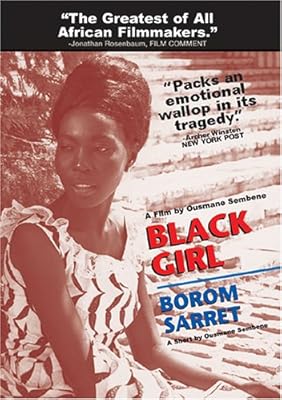Black Girl/Borom Sarret
Product Information (more info)
CERTAIN CONTENT THAT APPEARS ON THIS SITE COMES FROM AMAZON SERVICES LLC. THIS CONTENT IS PROVIDED 'AS IS' AND IS SUBJECT TO CHANGE OR REMOVAL AT ANY TIME.
Manufacturer Description
Diouana (Mbissine Thérèse Diop) is a stranger in a strange land. In Dakar, she was a nanny--a job she found fulfilling--but is forced to leave when her employers, Madame (Anne-Marie Jelinek) and Monsieur (Robert Fontaine), relocate to Antibes. The Riviera is lovely, but she is demoted to maid and regularly reminded of her exotic origins--treated as an object and exploited for her "Africanness." Proud and impassive, Diouana rarely speaks, but a running monologue reveals her growing disillusionment. "The kitchen, the bathroom, the bedroom, the living room. That's all I do. That's not what I came to France for!" So Diouana revolts the only way she knows how and stops doing everything for which she was taken from Senegal--cooking, cleaning, etc. Based on his short story, in turn inspired by actual events, Black Girl was the first feature from Ousmane Sembène (Faat Kiné), the premier filmmaker of Sub-Saharan Africa. Though shot in a crude new wave style, the 60-minute film (also released in a 70-minute edition), effectively delineates the life of an unseen individual with no means of solace or escape. Interestingly, all parts were dubbed by other actors, contributing to the sense of alienation--even between Madame and Monsieur, who were also happier in Dakar. Black Girl (La Noire de...) is accompanied by Sembène's 1963 debut, Borom Sarret. The 20-minute short offers an insightful look at a day in the life of a Dakar-based horse-cart driver (Ly Abdoulaye) or borom sarrett (from the French bonhomme charret). --Kathleen C. Fennessy
Key Product Details
- Director: Ousmane Sembene
- Number Of Discs: 1
- Run Time: 80 (Minutes)
- UPC: 717119013547



![Beauty and the Beast (The Criterion Collection) [Blu-ray] Beauty and the Beast (The Criterion Collection) [Blu-ray]](http://ecx.images-amazon.com/images/I/51e6tt00c4L.01_SL120_.jpg)


![Bishop's Wife, The (BD) [Blu-ray] Bishop's Wife, The (BD) [Blu-ray]](http://ecx.images-amazon.com/images/I/51CcLEO2OyL.01_SL120_.jpg)

![Bells of St. Mary's [Blu-ray] Bells of St. Mary's [Blu-ray]](http://ecx.images-amazon.com/images/I/51-tDtHumTL.01_SL120_.jpg)

